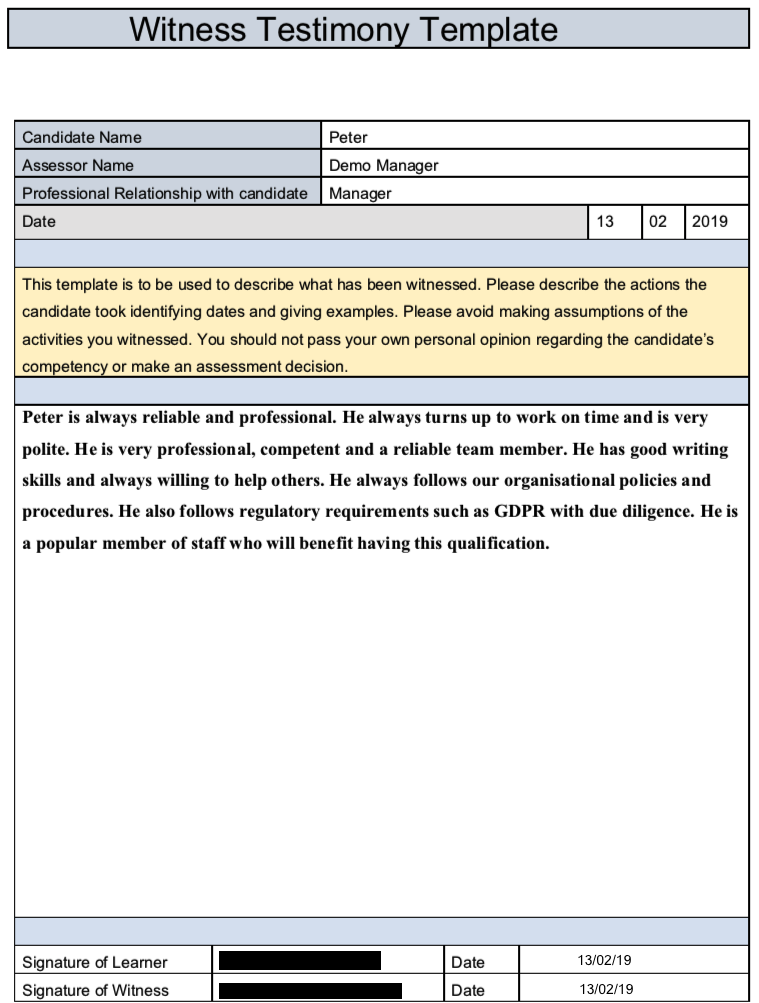
Coursetopia encourages the use of expert witnesses as part of the assessment process when working with learners in a learning and development setting. Awarding body approval might also be required before an expert can be used. Expert witnesses may be used where there are no occupationally competent assessors for certain specialist fields, sensitive environments, to minimise intrusion in the workplace or as a part of a range of assessment methods. All evidence from experts will need to be verified during quality assurance.
An expert witness must: – Have a working knowledge of the RQF units for which they are providing witness testimony; – Have experience and be occupationally competent in their area of expertise; – Have either a qualification that includes assessment of workplace performance or a professional work role that involves evaluating everyday practice of staff.
It is important that experts fully understand their role, responsibilities and the range of evidence they can provide. Learners will need to share the learning outcomes and assessment criteria of all units with expert/s. Inductions, support, and guidance is available to all experts upon request.
Learners would need to inform their assessor during induction and assessment planning that they seek to use experts. This will need to be acknowledged within your holistic assessment plan. Expert witnesses that have not been formally identified as part of your assessment strategy might not be accepted.
As highlighted above experts will need to demonstrate they are occupationally competent. They will need to state, their job role, experience, qualifications and relation to the learner on their first report. They should provide a contact number and email address. Copies of CV or relevant qualifications might be requested.
All types of relationships need to be declared. Issues such as conflict of interest are considered. Where an expert fails to declare their occupational competency they will be treated as an ordinary witness. Anyone can be a witness (clients, colleagues, supervisors etc). Caution is however exercised regarding the credibility of ordinary witnesses. Where there are concerns additional evidence might be required to supplement witness evidence to ensure all principles of assessments are met.
Experts will need to either provide evidence on official letterhead or utilise our expert witness form when providing evidence. Experts should provide an accurate record of what they have witnessed. They should not make an assessment decision or generalise without identifying context, specific events or activities. Dates should be provided. Evidence from expert witnesses should not appear to be a testimonial but simply a record of what has been observed. We do recognise the importance of maintaining confidentiality. Expert witnesses should not expose the personal details of clients or any organisational secrets. Please aim for quality rather than quality when writing your report.
The evidence should not be generic but a record of what has been witnessed at a particular time. For example, the following will not be acceptable:

The following is however appropriate:
I am the manager of Carewings and have been in the role for 7 years. I supervise Jade who works as an advisor. Her role involves supporting clients who have a range of needs such as being at risk of homelessness, domestic abuse and extreme poverty. Her other duties include supporting with career advice and employment.
I have observed Jade working with clients several times. One such occasion was on the 4th of May 2021. Jade had told me during supervision that she was going to be meeting client A. She had informed the client beforehand that l would be present sorely to observe her. I observed her email communications with the client that took place before the meeting. The language was appropriate, clear to understand and written in line with organisational guidelines. The client was provided information to prepare for the meeting such as the questions going to be asked and the documents that will be required such as her ID. She was also asked to come with a mask and given some information about the covid procedures in place. I also noticed that she was also given choice regarding the meeting time and date. This again fits in with the organisational ethos of being service user led and working in partnership with clients.
On the day of the meeting, Jade led the client to a quiet room where l was introduced. She informed her that l was her manager and was only there to observe her. Jade used open questions and double checked the client understood by asking questions, at times in a different way but serving the same purpose. Jade did not appear to rash the client and demonstrated good communication skills such as listening and body language.
Paragraph 1 confirms the occupational competency of the manager and relationship. It also confirms the job role of Jade and her eligibility to be on the course as an advisor.
Paragraph 2 confirms an observation that took place. The manager identified communication methods and skills, working in line with organisation procedures, health, safety, welfare, fairness, accuracy of records and preparing the client which can also be seen as empowerment.
Paragraph 3 confirms good practice, a supportive environment, double checking on understanding and building rapport with the client.